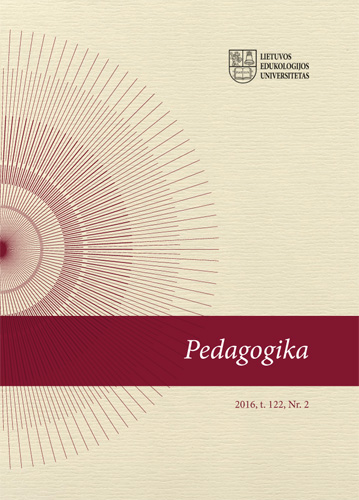Šeimos ir mokyklos ugdomųjų galių integracijos problemos
Problems of Integration of Family and School’s Educational Powers
Author(s): Marijona BarkauskaitėSubject(s): Education, Social psychology and group interaction
Published by: Vytauto Didžiojo Universitetas
Keywords: cooperation; approach; success factors; forms; integration of educational powers;
Summary/Abstract: Education system’s change regulating documents and researches as a main objective for personality development identify intellectual, creative, dignified and happy human’s (self-) education. To realize this objective Lithuanian educational system, which lays a sustainable basis for “ambitious and independent person, who responsibly and solidary generates his own, country and world’s future” (Valstybinė švietimo 2013–2022 metų strategija, 2013), must create certain conditions. The future-oriented (self-) education process organization in the school is exclusively influenced by the student’s family and relatives, who transfer their experiences to the child in all areas: language, culture, economy, etc., which the school continues to develop or correct. However, success of (self-) education is largely dependent on how the school and the family integrate and interact by combining the educational powers of two institutions, while planning and reaching for a mutual goal in all aspects of the educational process. The research aims to find out the school and family’s collaboration abilities, highlighting the teachers, parents, students and heads of schools’ approach to their cooperation, to identify the factors for successful communication, educational powers’ integration forms, involving parents in active, creative pedagogical process. The research uses quantitative and qualitative (standardized interview) methods. 315 students (6–10 forms), 134 teachers, 124 parents and 9 heads of schools were surveyed. The research showed that approach of respondents of all groups to family and school cooperation forms is positive, if it satisfies their main expectations: for the teachers the most important is to convey the information (journals, meetings); for parents – only the mandatory forms (journal); for learners - an electronic journal and meetings, where would be much more pleasant moments and no disclosing of information about them; for heads of schools – as little as possible meetings with parents. It was found in the research that families and schools’ reasons for insufficient amount of communication among the teachers and parents are the same: no one has the time, desire, extra work, negative information, etc. From learners’ point of view, there is a lack of mutual respect and responsibility, meaningful activities, the desire to help each other. While improving communication and integrating the family and school’s educational powers, the purposeful joint planning of activities, exchange of information and responsibility are necessary.
Journal: Pedagogika
- Issue Year: 122/2016
- Issue No: 2
- Page Range: 49-59
- Page Count: 11
- Language: Lithuanian

